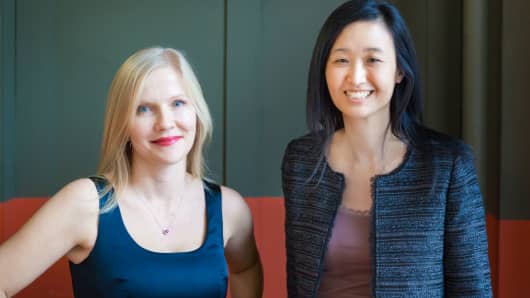The Golden Age for women entrepreneurs has finally begun. The stars have aligned to help trigger the trend as robust ecosystems churn out enterprising females equipped with inspiration, know-how and funding. In recent years, the rate of women entrepreneurs has been growing at a percentage at least double that of their male counterparts.
A microcosm of the trend is CNBC’S inaugural Upstart 25 list, where 10 of the company fledglings were founded by women in a host of industries — from neuroscience to finance to retail. Some also offer products and services with a social mission that are geared to women.
Take the founders of Dia & Co., No. 11 on the Upstart 25 list. When Nadia Boujarwah and Lydia Gilbert met at Harvard Business School in the fall of 2011, they began talking about the yawning gap in the retail market in serving women who wear sizes 14 and up. “I have been this customer all my life,” says Boujarwah.
On the hunt for fashionable clothes, they dreamed up the idea of a home-shopping service for plus-size women. About a year after graduation, they turned their idea into Dia & Co., a New York City-based company that sends subscribers boxes of clothing selected by a stylist. Recipients can buy what they like and return the rest.
Their target customers responded enthusiastically in market research, but the investors they approached in the mostly male investment community were skeptical. One reason was because plus-size women tend to spend less on clothing than women who wear smaller sizes, says Boujarwah.
“We tried to go to early-stage venture capitalists and professional angel investors and found that it was pretty challenging not just to be female entrepreneurs raising money in the world of venture capital but also female entrepreneurs serving a female customer very few people understood,” recalls Boujarwah.
That wasn’t the end of the story. Determined to succeed, the two women went on to raise “under $1 million” in convertible debt from friends, family and colleagues and grew the business on a shoestring, says Boujarwah. When they hit “hundreds of thousands of dollars a month in revenue,” she says, they returned to the venture capital circuit.
This time around, Boujarwah and Gilbert raised money from investors, including some early skeptics, and went on to bag a reported $18 million in September 2016 in a Series A round led by Sequoia Capital. All told, they have raised $25 million, said Boujarwah, who declined to share the firm’s revenue.

